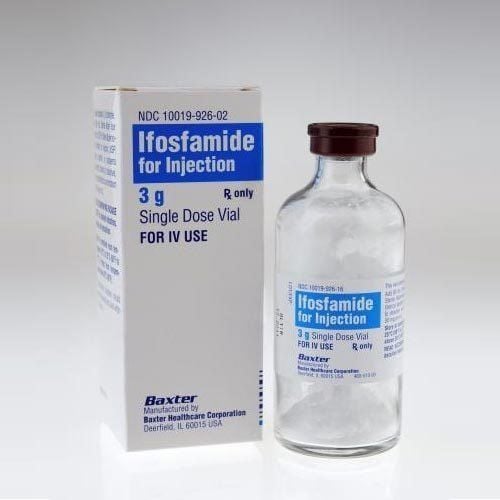This is an automatically translated article.
Article by Pharmacist Ly Anh Thu - Clinical Pharmacist - Faculty of Pharmacy - Vinmec Central Park International General HospitalAdcetris is a medicine to treat certain types of lymphoma (cancer of the lymph nodes). The drug is used when cancer cells have a CD30 protein on their surface. To ensure effective treatment, patients need to strictly follow the instructions of the doctor, professional pharmacist.
1. What is Adcetris?
Adcetris is a medicine to treat certain types of lymphoma (cancer of the lymph nodes). The drug is used when cancer cells have 1 type of CD30 protein on their surface (CD30 positive).
Adcetris is indicated in adults for the treatment of relapsed or refractory Hodgkin CD 30+ lymphoma:
After autologous stem cell transplantation or after at least 2 courses of cell transplantation. Autologous stem cells or multiple chemotherapy are not an option for treatment. Adcetris is indicated in adults for the treatment of relapsed or refractory large cell lymphoma.
2. How to use Adcetris
Brentuximab vedotin should be used under the supervision of a physician experienced in the field of cancer treatment.
Dosage: The recommended dose is 1.8mg/kg intravenously over 30 minutes every 3 weeks.
Patients with renal impairment: The recommended starting dose for patients with severe renal impairment is 1.2 mg/kg intravenously over 30 minutes every 3 weeks. Patients with renal failure should be closely monitored to detect possible adverse events in a timely manner. Hepatic Impairment: The recommended starting dose for patients with severe renal impairment is 1.2 mg/kg intravenously over 30 minutes every 3 weeks. Patients with liver failure should be closely monitored to detect possible adverse events in a timely manner. If the patient weighs more than 100 kg, the dose should be calculated with 100 kg. In addition, a complete blood count should be obtained prior to each administration of the drug. Patients should be monitored during and after the infusion.
3. Undesirable effects when using Adcetris
Some unwanted effects that may occur with the use of Adcetris include:
Progressive multifocal leukoencephalopathy (a rare form of central nervous system demyelinating disease, as a result of this phenomenon). John Cunningham virus activation). Patients should be closely monitored for new or worsening neurological, cognitive, or behavioral signs or symptoms that may suggest progressive multifocal leukoencephalopathy. Pancreatitis Pulmonary toxicity Severe and opportunistic infections Infusion-related reactions Tumor lysis syndrome: Patients with rapidly proliferating tumors or large tumor masses are at risk. high risk of tumor lysis syndrome. Peripheral neuropathy Hematologic toxicity Febrile leukopenia Stevens-Johnson syndrome and toxic epidermal necrolysis Liver function Hyperglycemia Severe and opportunistic infections have been reported in patients treated with drug treatment. In the phase 2 population, 16% of patients presented with signs suggestive of infection.
The most common adverse reactions reported in the phase 2 population included: sensory peripheral neuropathy, fatigue, nausea, diarrhea, neutropenia, vomiting , fever and upper respiratory infections.
4. Some notes when using Adcetris
Subjects to drive and use machines: Brentuximab may have slight effects on the ability to drive and use machines. Therefore, these subjects need to be careful when driving and operating machinery.
Women of childbearing potential: 2 effective methods of contraception should be used during treatment for up to 6 months after stopping the drug
Pregnant women: There are no data on the use of Brentuximab vedotin in women. pregnant. Animal studies have shown reproductive toxicity. Brentuximab vedotin should not be used during pregnancy, unless the potential benefit to the mother outweighs the potential risk to the fetus. If a pregnant woman requires drug therapy, the patient should be adequately counseled about the potential risk to the fetus.
Lactation: There are no data to confirm whether Brentuximab vedotin or its metabolites are excreted in human milk. A risk to the neonate/breastfeeding cannot be excluded. A decision should be made whether to discontinue nursing or to discontinue/delay dosing, based on the potential risk to the nursing infant and the potential benefit to the mother.
Reproductive function: In clinical trials, Brentuximab vedotin caused testicular toxicity and therefore may affect male reproductive function. Therefore, male patients about to take the drug are advised to freeze their sperm before starting treatment. Male patients at the end of treatment with this drug should be advised not to have children during treatment and for up to 6 months after the end of the last dose.
5. Interactions with other drugs and other forms of interaction
Interactions with drugs metabolised via the CYP3A4 pathway (CYP3A4 inhibitors/inducers):
Concomitant administration of Brentuximab vedotin with Ketoconazole, a strong inhibitor of CYP3A4 and P-gp, increased exposure. with the monomethylauristatin E (MMAE) vasodilator by approximately 73%, and did not alter the plasma exposure of Brentuximab vedotin. Therefore, concomitant use of Brentuximab vedotin with strong inhibitors of CYP3A4 and P-gp may increase the incidence of neutropenia.
6. Drug storage conditions
Store Adcetris in the refrigerator (2°C-8°C). Not frozen. Keep the vial in the product's carton to protect it from light.
In a nutshell, Adcetris is a drug for the treatment of certain types of lymphoma. The drug is used when cancer cells have a CD30 protein on their surface. To ensure effective treatment, patients need to strictly follow the instructions of the doctor, professional pharmacist.
Please dial HOTLINE for more information or register for an appointment HERE. Download MyVinmec app to make appointments faster and to manage your bookings easily.
References: 1. Adcetris User Manual.
2. European Medicines Agency. Adcetris. Accessed on April 4th, 2022.













